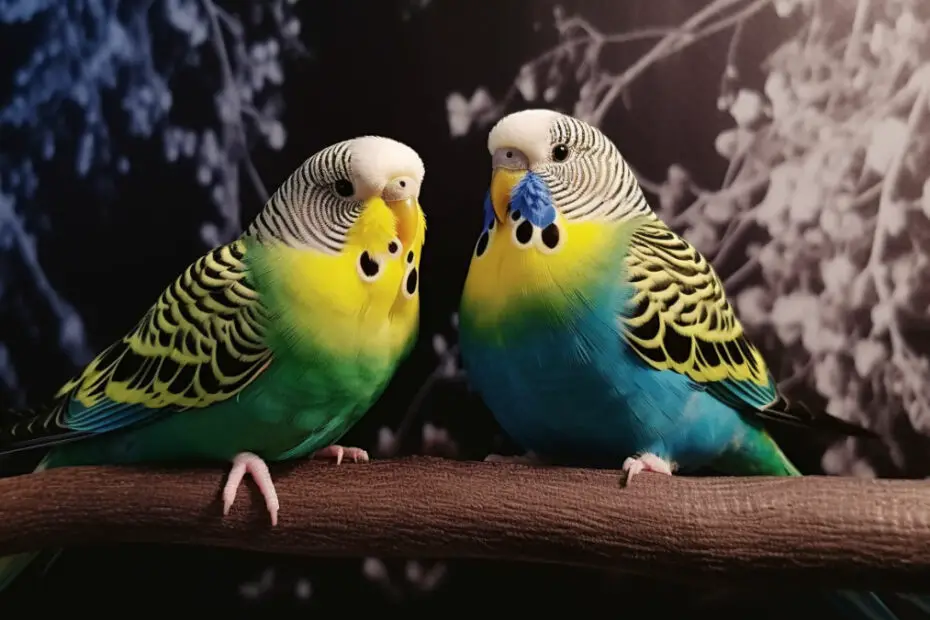Budgies, also known as Budgerigars or Parakeet, are a popular pet and are considered the third most popular pet in the world after domesticated cats and dogs. Surprisingly their average lifespan is about the same as cats and higher than dogs.
So, how long do budgies live? Budgies typically live for 5 to 10 years in captivity, although some have been known to live up to 15 years or even longer with proper care. Factors that can affect budgie lifespan include diet, exercise, environment, genetics, and overall health.
However, not all types of parakeets have the same life expectancy. Find out more about the factors that affect budgie lifespans, tips for increasing their lifespan, and how to provide optimal care for these beloved pet birds.
How Long Do Budgies Live?
A wild budgerigar’s average lifespan is generally shorter than a domesticated budgie’s. It’s considered lucky for a wild parakeet to live up to 5 years, and living beyond 8 years would be exceptional.
The average budgie lifespan is around 5 to 15 years in captivity, although it’s uncommon for them to reach 15 years as that is considered exceptionally rare for a budgie. However, the lifespan of a pet parakeet largely depends on the quality of care it receives.
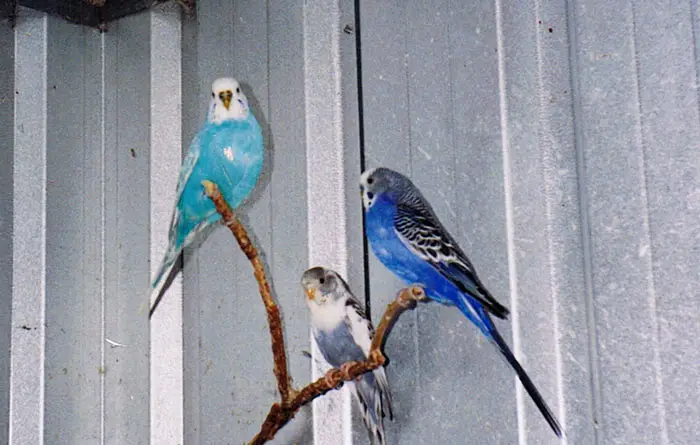
Besides, budgie lifespan can vary depending on their type. Mainly there are 2 types of budgies: American and English parakeets. American parakeets live longer (8-12 years) than English budgies (5-7 years).
According to reports from experienced parakeet keepers and breeders, female budgie life expectancy is longer than male birds. But the difference isn’t very long, just a few months.
Factors Affecting A Budgie’s Lifespan
Many factors can influence the budgie’s lifespan. Breed, diet, environment, care, and budgie exercise are some of them.
Budgie Breeds/Genetics
Some breeders prioritize producing as much as possible to maximize profits without examining potential genetic issues or birth defects. This can result in health problems and genetic diseases.
Genetics also plays a crucial role in the lifespan of a Parakeet, but unfortunately, it’s not something that can be influenced. For example, genetically, English parakeets have shorter life spans than American.
Diet
These birds require a well-balanced diet that includes fresh fruits, vegetables, and seeds. Poor diet, such as a diet high in seeds or low in essential nutrients, can lead to health issues and shorten their lifespan.
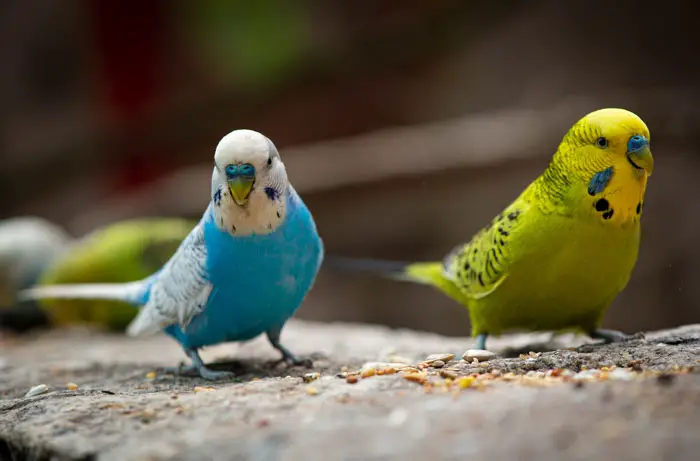
Care
Parakeets are prone to certain health issues, such as respiratory infections, mites, and nutritional deficiencies, which can be diagnosed and treated early with proper veterinary care.
Neglecting a budgie’s health condition and being left untreated can shorten a budgerigar’s lifespan.
Environment
A clean, stress-free budgie environmental factors can help your bird live a longer and healthier life. Exposure to drafts, extreme temperatures (above 90 °F), or toxins can also negatively affect a budgerigar’s health and lifespan.
Exercise
Exercise is also crucial for a budgerigar’s health and longevity. Although they’re small birds, they’re active and energetic creatures that require regular exercise.
Regular exercise can help prevent obesity and other health issues and enhance life expectancy.
Comparison of Budgie Lifespan with Other Pet Bird Species
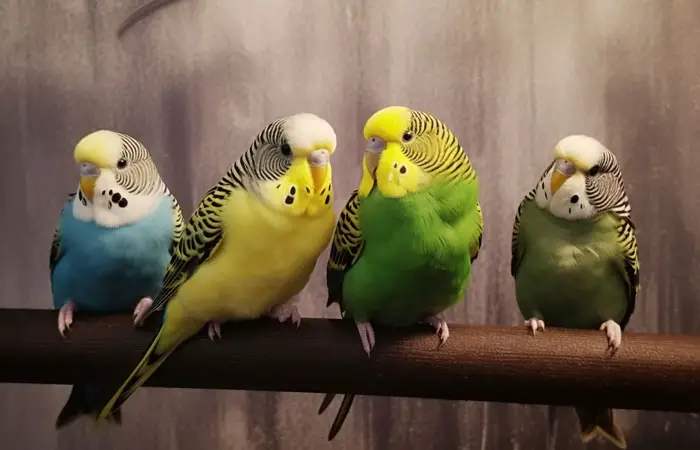
The average lifespan of different bird species can vary greatly depending on factors such as diet, genetics, environment, and overall care their owners provide. Here’s a comparison of bird lifespan by species:
| Species | Wild Lifespan | Captivity Lifespan |
|---|---|---|
| Cockatiel | 10 to 15 years | 16 to 25 years |
| Conure | 10 to 15 years | 20 to 30 years |
| Parrotlet | 10.4 years | 15 to 20 years |
| Dove | 1 to 1.5 years | 20 years |
| Lovebirds | 5 to 15 years | 10 to 20 years |
| Finch | 4 to 7 years | 15 to 20 years |
| Kakariki Parrot | 5 years | 15 to 20 years |
| Senegal Parrot | 25 to 30 years | 50 years |
| Quaker Parrot | 15 years | 20 to 30 years |
| Caique | 30 years | 50 years |
| Pionus Parrot | 22 years | 25 to 40 years |
| Cockatiels | 10 to 15 years | 16 to 25 years |
Common Health Issues Affecting Budgie Lifespan
Like any other pet, parakeets are susceptible to various health issues that can affect their lifespan. Here are some of the most common budgie health problems:

1. Respiratory Infection
Respiratory infections are one of the most common health problems that parakeets face. These infections can cause various symptoms, including sneezing, coughing, and wheezing. If untreated, respiratory infections can lead to severe complications, even death.
Prevention and Treatment
Maintaining a healthy diet, ventilation, and good hygiene can prevent this disease. The veterinarian may prescribe antifungal or anti-inflammatory drugs and antibiotics as treatment options to combat the infection effectively.
2. Avian Gastric Yeast (AGY)
AGY infection is caused by yeast microbes in infected food and fecal matter. When a Parakeet ingests this infected food or fecal matter, it can develop an infection in its digestive system.
Prevention and Treatment
Avian gastric yeast doesn’t have a vaccine for prevention. The most effective method to stop its spread is clearing and quarantining the birds for 30 days.
The treatment for this infection involves the administration of medications and a healthier diet.
3. Mites
These tiny parasites live on the skin of birds and other animals. Several mites can infect budgies, including red, feather, and scaly leg mites. Each type of mite causes a range of health problems for parakeets, including feather loss, itching, and skin irritation.
Prevention and Treatment
Regular cleaning of the cage and Parakeet habitat is the only prevention. Applying Ivermectin drops on the skin of birds and Moxidectin is a highly effective treatment method.
4. Fatty Liver Disease
This is also known as hepatic lipidosis. It occurs when there is an excessive fat buildup in the liver, which can lead to serious health complications if left untreated. Seed-based diets, often recommended for budgies, can be very high in fat.
Prevention and Treatment
Low fat and sugar diet with plenty of fruits and vegetables can prevent this disease. Natural remedies like Ayurveda herbs, policosanol, and milk thistle can treat this disease.
5. Candidiasis
This fungal infection can affect the digestive tract, respiratory system, and skin.
Candidiasis is caused by a fungus called Candida Albicans, which lives in a contaminated environment and can multiply rapidly if the conditions are favorable.
Prevention and Treatment
Regular disinfecting and cleaning of the nest box, utensils, and cage can prevent Candidiasis infection. The most common treatment is the antifungal drug Nystatin.
Signs of Illness
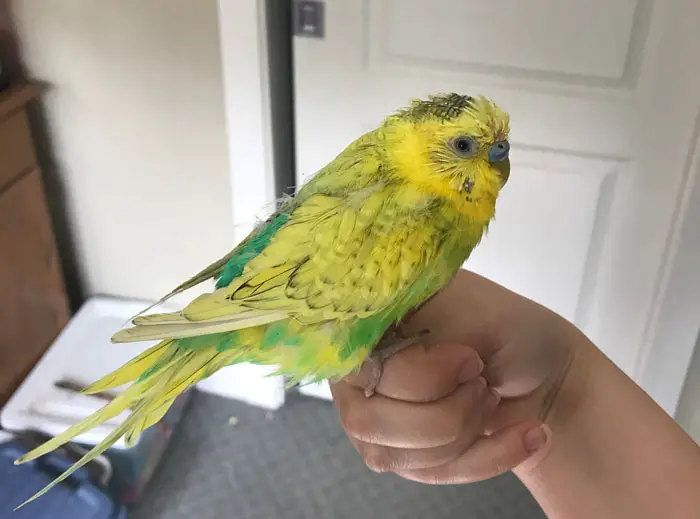
As a responsible pet owner, it’s crucial to be aware of the subtle signs of illness in parakeets. Here are some common signs of illness in budgies:
- Fluffed-up feathers
- Loss of appetite
- Sneezing or coughing
- Lethargy
- Discharge from eyes or nostrils
- Changes in appearance
- Drinking less or more than usual
- Holding or limping one leg up
- Overgrown beak
- A behavior change
- Hot feet
- Unusual bleeding
- Dull or sunken eyes
- Losing balance, falling, or teetering
- Regurgitation or vomiting
- Swelling or lumps in the body
When to Seek Veterinary Care for A Budgie
If you notice any of the above signs of illness in your budgie, it’s important to seek veterinary care as soon as possible.
Parakeets are experts at hiding signs of illness, so by the time you notice symptoms, the illness may have already progressed. Delaying veterinary care could result in a more severe illness or even death.
Tips for Ensuring a Long And Healthy Life for Your Budgie
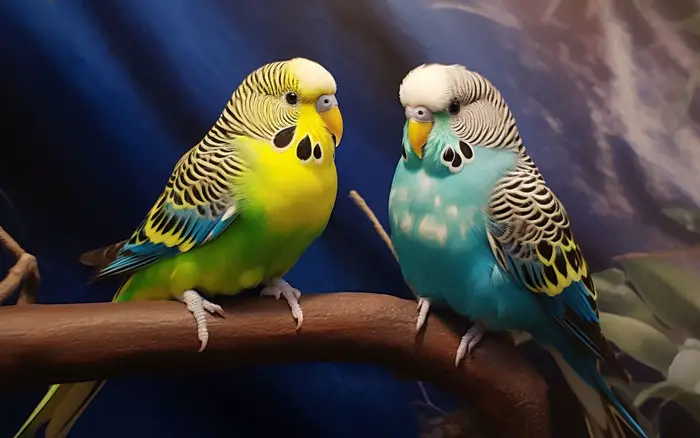
The world’s longest living Parakeet was 29 years old. If you also want your beloved bird to live longer, here is how to increase budgie lifespan:
Proper Budgie Diet and Nutrition
One of the most critical factors in maintaining your budgie health condition is providing them with a healthy and balanced diet. A healthy budgie’s diet should include fresh fruits, grain crops, vegetables, and high-quality seeds.
Avoid feeding your Parakeet sugar-filled or high-fat foods, which can lead to obesity and health issues.
Appropriate Environmental Conditions
Creating a comfortable and safe budgie environment promotes longevity. Ensure your bird’s cage is appropriate, with plenty of room to fly around. The spacing between cage bars should be around 3/8 inches.
Provide perches and toys to keep your parakeet mentally stimulated and active. Also, ensure their cage is protected from extreme temperatures, drafts, and direct sunlight.
Mental Stimulation
This is an important budgie care tips for longevity that you can’t ignore. Budgies are highly intelligent birds and require mental stimulation to keep their minds active and healthy.
Provide them with toys and puzzles to keep them entertained and engaged. You can also play music, talk to them, or teach them tricks to keep them mentally stimulated.
Exercise
Parakeets are naturally active birds and require daily exercise to maintain their health. Provide them ample opportunities for flying and perching inside and outside their cage to keep their musgie diet,cles toned and their minds engaged.
Regular Veterinary Care
Proper budgie veterinary care is essential for ensuring the health and well-being of your feathered friend. Routine care should include regular check-ups, beak and nail trimming, and wing clipping.
If you notice any unusual behavior or changes in your budgerigar’s appearance, seek veterinary care immediately.
Preventative Care
Do a complete medical check-up every 6-12 months. Regular annual fecal examination to detect and treat yeast, parasites, and bacterial infections.
Blood work is to be done yearly, and trim nails and wings regularly to maintain good budgie health.
Monitoring budgie aging is also an important aspect of responsible bird care to ensure their health and well-being throughout their lifespan.
Tips for Identifying and Addressing Potential Health Issues of Budgie
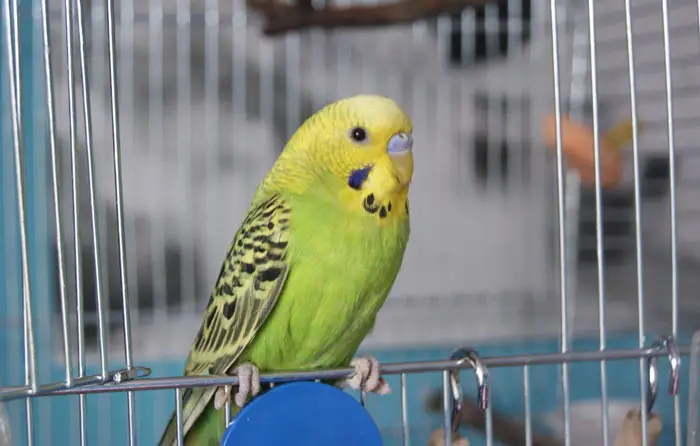
Early detection and intervention can significantly improve your bird health and well-being. Here are some tips to help you:
- Observe your parakeet’s behavior regularly
- Keep an eye on your budgerigar’s droppings. Any changes in color, consistency, or frequency may indicate digestive or other health issues
- Check your parakeet’s feathers and skin for signs of abnormality, such as loss of feathers, flakiness, redness, or swelling
- Examine your budgie’s eyes for any signs of discharge, redness, or cloudiness, which may indicate an infection or injury
- Check your parakeet’s feet and legs for swelling, sores, or signs of injury
- Pay attention to your parakeet’s eating habits. Loss of appetite, difficulty eating, or changes in drinking behavior may indicate a health issue
- Be alert to any changes in your parakeet’s weight. Sudden weight loss or gain can indicate an underlying health problem
- Unusual or excessive vocalization or silence may indicate distress or illness.
FAQs
Let’s check out a few more questions that most people ask regarding a budgie’s lifespan.
To increase your pet bird’s lifespan, provide a balanced diet with fresh fruits, vegetables, and high-quality seeds, regular exercise, a clean environment, and regular vet check-ups.
Different budgie breeds generally have similar lifespans, averaging around 5-15 years, but individual care and genetics also play a role.
To prevent your budgie from getting sick, provide a clean and spacious cage with fresh food and water daily. Avoid exposing your parakeet to extreme temperature changes, drafts, and cigarette smoke. Keep your budgie away from other sick birds and avoid overcrowding.
Signs of a healthy parakeet include clear eyes, clean nostrils, smooth feathers, active behavior, and a good appetite. They’re alert to their upright surroundings. The droppings contain a solid black or dark green component, a transparent portion, and a creamy white section.
To help your parakeet live a long and happy life, provide a nutritious and varied diet. Ensure clean water is always available and offer regular exercise and mental stimulation through toys. Also, provide a comfortable and safe living environment and schedule regular visits to an avian veterinarian for check-ups and vaccinations.
Conclusion
While the average lifespan is around 5-15 years, some budgies can live up to 20 + years or more with proper budgie care and attention.
It’s essential to be informed about common health issues that budgies may face, such as respiratory infections, mites, and obesity, and take preventive measures to keep them healthy.
Factors such as diet, exercise, mental stimulation, and regular veterinary check-ups are vital in determining avian longevity. Owners can ensure their feathered friends live long and fulfilling lives by being proactive and attentive to their budgies’ needs.
So, let’s strive to give our budgies the best care possible and enjoy their delightful companionship for many years.
